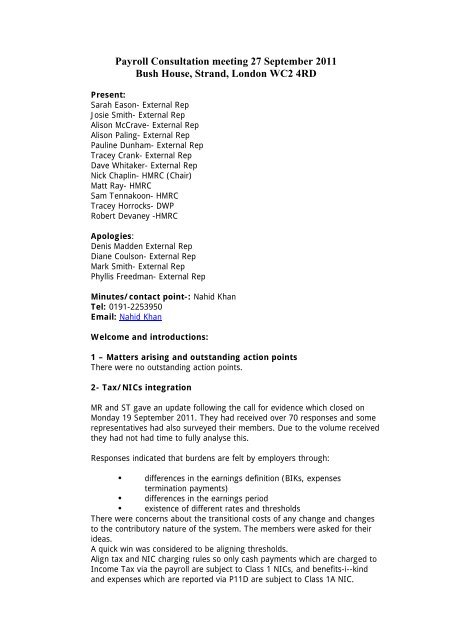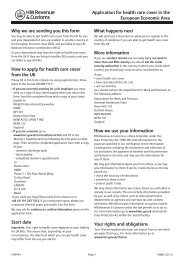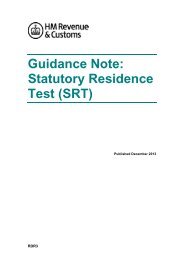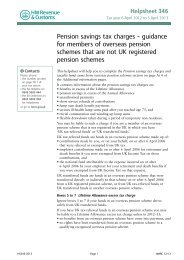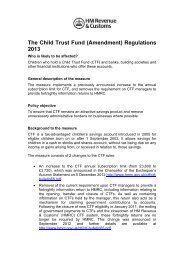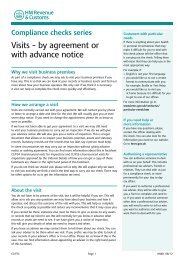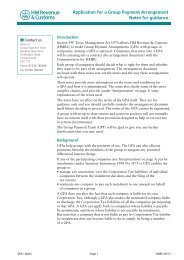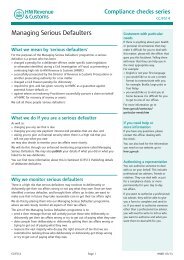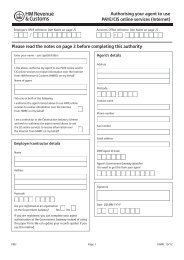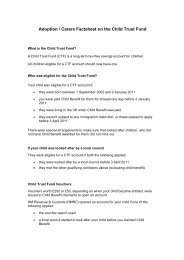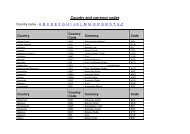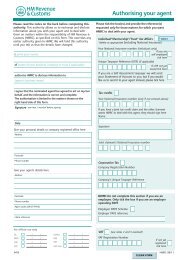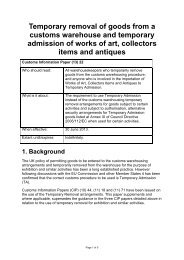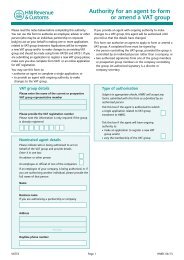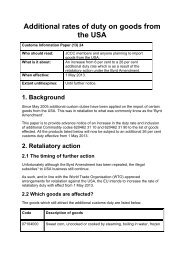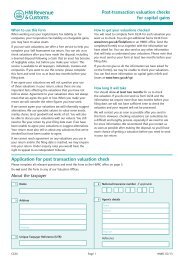27 September 2011 (PDF 44K) - HM Revenue & Customs
27 September 2011 (PDF 44K) - HM Revenue & Customs
27 September 2011 (PDF 44K) - HM Revenue & Customs
Create successful ePaper yourself
Turn your PDF publications into a flip-book with our unique Google optimized e-Paper software.
Payroll Consultation meeting <strong>27</strong> <strong>September</strong> <strong>2011</strong><br />
Bush House, Strand, London WC2 4RD<br />
Present:<br />
Sarah Eason- External Rep<br />
Josie Smith- External Rep<br />
Alison McCrave- External Rep<br />
Alison Paling- External Rep<br />
Pauline Dunham- External Rep<br />
Tracey Crank- External Rep<br />
Dave Whitaker- External Rep<br />
Nick Chaplin- <strong>HM</strong>RC (Chair)<br />
Matt Ray- <strong>HM</strong>RC<br />
Sam Tennakoon- <strong>HM</strong>RC<br />
Tracey Horrocks- DWP<br />
Robert Devaney -<strong>HM</strong>RC<br />
Apologies:<br />
Denis Madden External Rep<br />
Diane Coulson- External Rep<br />
Mark Smith- External Rep<br />
Phyllis Freedman- External Rep<br />
Minutes/contact point-: Nahid Khan<br />
Tel: 0191-2253950<br />
Email: Nahid Khan<br />
Welcome and introductions:<br />
1 – Matters arising and outstanding action points<br />
There were no outstanding action points.<br />
2- Tax/NICs integration<br />
MR and ST gave an update following the call for evidence which closed on<br />
Monday 19 <strong>September</strong> <strong>2011</strong>. They had received over 70 responses and some<br />
representatives had also surveyed their members. Due to the volume received<br />
they had not had time to fully analyse this.<br />
Responses indicated that burdens are felt by employers through:<br />
� differences in the earnings definition (BIKs, expenses<br />
termination payments)<br />
� differences in the earnings period<br />
� existence of different rates and thresholds<br />
There were concerns about the transitional costs of any change and changes<br />
to the contributory nature of the system. The members were asked for their<br />
ideas.<br />
A quick win was considered to be aligning thresholds.<br />
Align tax and NIC charging rules so only cash payments which are charged to<br />
Income Tax via the payroll are subject to Class 1 NICs, and benefits-i--kind<br />
and expenses which are reported via P11D are subject to Class 1A NIC.
Align the self-employed, IR35, could also tackle CIS (possible considerable<br />
savings).<br />
There would be differences between Limited Cos and self-employed views.<br />
NICs on cumulative and annual basis.<br />
Take away evasion by directors – annual check at end of year and on leaving.<br />
Termination payments.<br />
Deferment of NICs.<br />
Percentage of reductions not whole numbers.<br />
Changes to the way NICs operate, for example a move to an annual and<br />
cumulative basis may see some employers and employees pay more or less<br />
than they currently pay. In particular, the Government needs to make sure it<br />
understands the impact of any changes on low paid employees before<br />
committing to reform.<br />
The quick wins should be implemented as soon as practicable after<br />
consultating on detail, with other more radical potential charges subjected to<br />
detailed thought and consultation.<br />
There is the scope to make the system easier as currently it is difficult to<br />
change something when an earnings period is closed.<br />
The formal consultation is due in the autumn<br />
AP - MR is happy to come back in December <strong>2011</strong> to give a further update.<br />
3-Universal Credits- Tracey Horrocks<br />
The Department for Work and Pensions (DWP) announced its strategy for<br />
moving 12 million working-age benefit and credit recipients on to Universal<br />
Credit by 2017.<br />
Universal Credit is intended to provide a streamlined welfare system which<br />
makes the financial advantages of taking work or increasing hours clear to<br />
claimants. We recognise that the move from one welfare system to another<br />
needs to be carefully managed to ensure social outcomes are maximised and<br />
no one is left without support.<br />
The transition from the old benefit system to Universal Credit will therefore<br />
take place in three phases over four years, ending in 2017 with around 7.7<br />
million households receiving more support to find more work and be more selfsufficient.<br />
Between October 2013 and April 2014, 500,000 new claimants will receive<br />
Universal Credit in place of Jobseeker's Allowance, Employment Support<br />
Allowance, housing benefit, Working Tax Credit and Child Tax Credit. At the<br />
same time, a further 500,000 existing claimants (and their partners and<br />
dependants) will also move on to Universal Credit as and when their<br />
circumstances change significantly, such as when they find work or when a<br />
child is born.<br />
From April 2014, the second phase will give priority to households who will<br />
benefit most from the transition, such as those Working Tax Credit claimants<br />
who currently work a small number of hours a week but could work more<br />
hours with the support that Universal Credit brings. Overall, 3.5 million existing<br />
claimants (and their partners and dependents) will be transferred on to<br />
Universal Credit during this second phase.<br />
The last and final phase, which begins at the end of 2015 and runs through to<br />
the end of 2017, will see around three million households being transferred to
Universal Credit by local authority boundary. This phase will have the flexibility<br />
to respond to the circumstances of particular local authorities as they change<br />
and will focus on safeguarding financial support, such as housing benefit<br />
payments, to claimants as the old benefit system winds down.<br />
The DWP will continue to work with <strong>HM</strong>RC and local authorities to settle on a<br />
precise timing schedule of the move to Universal Credit. Once agreed, the<br />
schedule will be kept under regular review.<br />
4- Employer Dashboard- Harry Armstrong<br />
HA introduced the Employer PAYE Dashboard concept - a new idea designed<br />
to give employers access to their PAYE performance metrics, and enhance<br />
<strong>HM</strong>RC’s ability to deal with employer issues in a joined up way. The areas<br />
covered were:<br />
� Introduction to Data Improvement Programme, data quality<br />
initiatives<br />
� Explanation of Employer PAYE Dashboard (EPD) concept<br />
� Demonstration of dashboard prototype<br />
� Walk through of possible dashboard data items<br />
� Additional functionality ideas<br />
� Benefits/costs envisaged<br />
5- Income Tax Self Assessment penalties and interest<br />
Background<br />
As a result of the merger of two Departments (Inland <strong>Revenue</strong> and <strong>Customs</strong><br />
and Excise) the O’Donnell Review identified the need for a review of 'Powers'.<br />
The policy team reviewed the legislation and designed new penalty models.<br />
These models were aligned where possible with the objective of changing<br />
behaviour rather than raising revenue - <strong>HM</strong>RC want the return.<br />
The penalties increase the longer the default continues.<br />
<strong>HM</strong>RC are now implementing the penalty changes using a staged approach<br />
and currently are introducing the changes to PAYE late payments, Construction<br />
Industry Scheme and Income Tax Self Assessment.<br />
Changes to penalty regime<br />
The penalty changes for Income Tax Self Assessment late filing will commence<br />
for the tax year 2010-11.<br />
The penalties only affect those that do not meet their obligation.<br />
The new late filing structure is:<br />
� the removal of capping a penalty<br />
� an automatic fixed £100 penalty immediately the return is late<br />
� automatic daily penalties of £10 per day for up to 90 days<br />
commencing at three months<br />
� a Tax Geared Penalty at six months of 5 per cent of the amount<br />
shown on the return or a minimum charge of £300, whichever<br />
is greater
� a Tax Geared Penalty at 12 months of 5 per cent of the amount<br />
shown on the return or a minimum charge of £300, whichever<br />
is greater<br />
The percentage element at 12 months could be up to 100 per cent if, by failing<br />
to submit the return, the customer is deliberately withholding information that<br />
would enable <strong>HM</strong>RC to assess their liability.<br />
Interest will be charged on all late payments of penalties.<br />
The new late payment penalty structure is:<br />
� a 5 per cent Tax Geared Penalty 30 days after the due date<br />
� a second 5 per cent Tax Geared Penalty at six months after the<br />
due date<br />
� a third 5 per cent Tax Geared Penalty at 12 months after the<br />
due date<br />
Information to customers:<br />
� an information sheet explaining the changes was sent out with<br />
the 2010-11 notices to file a return and paper returns in April<br />
<strong>2011</strong><br />
� we intend to minimise letters by combining messages onto one<br />
letter where possible and appropriate to do so<br />
� we want to work with external organisations to inform and<br />
support the transition to this new structure<br />
� we want customers to come to us especially if they believe that<br />
they should not receive an Income Tax Return<br />
� we are keen to ensure we only send out returns and notices to<br />
file to those who should be filing a return<br />
� we are planning regular targeted updates with agents and<br />
customer groups<br />
Key messages<br />
This means our Self Assessment customers need to file their tax returns by the<br />
appropriate deadlines so we can calculate how much they need to pay quickly,<br />
efficiently and accurately. Once this calculation has taken place, they also need<br />
to pay what they owe on time.<br />
This gives the customer certainty over their tax affairs and allows us to collect<br />
what is owed efficiently. The overwhelming majority of our customers do fulfil<br />
their tax obligations by filing and paying on time.<br />
Despite the well publicised deadlines, there remains a significant minority of<br />
customers who fail to comply with their tax obligations by either filing or<br />
paying past the set deadlines, or not at all.<br />
For customers intending to file a paper return but who miss the 31 October<br />
deadline it is still possible to avoid a penalty by sending an online return by the<br />
31 January deadline.<br />
The message is simple - customers who file their returns and pay the due<br />
amounts on time and in full have nothing to worry about. These changes will<br />
not affect them.<br />
These are robust measures designed to deter those who fail to comply with SA<br />
deadlines. It must be remembered that the overwhelming majority of SA<br />
customers are compliant and meet their filing and payment obligations.<br />
Customers who deliberately fail to comply with the deadlines or fail to pay<br />
amounts that are owed to the public purse directly affect <strong>HM</strong>RC’s ability to
collect money that pays for vital public services such as schools and hospitals.<br />
<strong>HM</strong>RC will identify and take action against these customers.<br />
AOB- updates<br />
Orderline strategy<br />
In February <strong>2011</strong> edition of the Bulletin <strong>HM</strong>RC told employers that they were<br />
reducing the number of paper products we provided and as most employers<br />
now have to file online, they would also expect them to use the online PAYE<br />
forms and guidance which are available from <strong>HM</strong>RC website at PAYE for<br />
employers.<br />
Alternatively, the Find a Form’ tool will help employers to find forms for a<br />
variety of subjects.<br />
This is in line with the Government’s 'Digital Default' agenda which provides a<br />
commitment to move more Government Services online and reduce the cost of<br />
the services <strong>HM</strong>RC currently provide.<br />
Since then there has been a significant reduction in the number of paper<br />
products being issued by the Employer Orderline. Recent customer feedback<br />
confirms that the majority of employers and their agents are happy to self<br />
serve from our website, many using the Basic PAYE Tools, and they have<br />
continued to meet their PAYE payroll obligations.<br />
Potential changes in 2012<br />
<strong>HM</strong>RC are now considering what further measures may be possible in these<br />
times of austerity, so that they might continue to drive down costs, help<br />
reduce carbon footprint and benefit the environment, by limiting the amount of<br />
paper being used. Following consultation over the coming months, <strong>HM</strong>RC aim<br />
to:<br />
� reduce the number of versions of some forms such as P45 and<br />
P60<br />
� produce downloadable forms which are easier to print and use,<br />
such as the P11 form on the website<br />
� remove availability of some paper items, such as forms CA6855<br />
and SC2<br />
� revise the Employer Orderline online form to reduce the number<br />
of items available to order online<br />
Details of the changes will be published on the ‘Forms and Publications for<br />
employers’ pages of the Business Link website when they are introduced. Also<br />
watch out for the next edition of the Employer Bulletin due in February 2012,<br />
at the above link, which will provide the finalised arrangements for the<br />
Employer Orderline next year.<br />
<strong>HM</strong>RC appreciate your co-operation and any feedback (via the Editor as shown<br />
on Page 1 please) during these times of change<br />
Employer Office<br />
The Employer Engagement Team (EET) continues to develop its role with<br />
partners in Large Business Services/L&C and Debt Management and Banking,<br />
<strong>HM</strong>RC have also established escalation routes for Agent Account Managers to<br />
come direct to teams where they cannot get resolution through BAU channels
and this now seems to be working well. Employer Office are also heavily<br />
involved in the RTI programme and the EET will act as 'hand holders' for the<br />
140 or so SME's who will join the RTI Pilot in April 2012.<br />
Employer Office have recently begun a pilot with EHL to look at ways to work<br />
more closely together to improve the overall service, it is very early days but<br />
the teams from Employer Office and EHL have already identified areas where,<br />
with perhaps some extra IT functionality and training EHL will be able to do a<br />
more complete job instead of having to send so much to Employer Office for<br />
further action. This pilot offers a great opportunity to develop a better service<br />
and for EO and EHL to help each other out more at future peak times.<br />
RTI update<br />
During the last couple of month’s the Customer Migration Team held a series<br />
of 'Boot Camp' events for the Customer Relationship Managers (CRM’s) who<br />
will be supporting the RTI Pilot Employers during the Pilot. The purpose of<br />
those events was to discuss their role in supporting the volunteer employers<br />
and equip them with sufficient background and support material to carry this<br />
out. Each Boot Camp event lasted one day and consisted of a variety of<br />
presentations including background information about RTI, The Pilot, and the<br />
role of the CRM in the pilot. We were pleased that a few representatives from<br />
TDSF were also able to attend this event, and give very useful feedback. In<br />
addition to the Boot Camp events the Customer Migration Team are now<br />
finalising the next set of events which will be for those employers taking part<br />
in the pilot. There will be approximately five of these at various venues around<br />
the country. Their purpose is to provide an understanding of what changes RTI<br />
will bring for employers, and to explain what employers in the pilot will need to<br />
do in preparation of commencing in the pilot in April 2012.<br />
Over the next few months, the Policy/Customer Engagement Team will be<br />
embarking on delivering a series of customer update seminars for a variety of<br />
external stakeholders. For many of those customers the last update delivered<br />
by the team was during the consultation period, so these events will be<br />
beneficial for relaying some of the prominent changes following the<br />
consultation period. A formal response to the consultation summary is<br />
currently being prepared for publication in the autumn. The guidance and draft<br />
legislation are also in progress for release in coming months.<br />
The RTI team are continuing to engage with stakeholders in various different<br />
forums and will continue to do so throughout the RTI migration period.<br />
The Data Improvement Team is also continuing to do some key work around<br />
data quality. This includes educating employers about the importance of<br />
improving their data quality in preparation for RTI. As we approach the<br />
mandation of RTI, the team will work with some employers in improving legacy<br />
data for all current employees prior to RTI’s implementation.<br />
Date of next meeting – 13 December <strong>2011</strong> Bush House, London.


